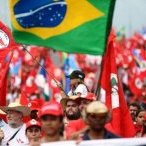
20 February 2014 | Interviews | VI Congreso MST-Brasil | Food Sovereignty | Mano a Mano
Brazil: Assessment after 6th MST Congress
Interview with Itelvina Massioli, MST National Leader
A two-and-a-half year process of work which resulted in a meeting with several thousand Brazilian peasants; “a process that didn´t start now, and that won´t end here”, said Itelvina Massioli, national leader of the peoples´ struggle for land, agrarian reform and food sovereignty, in interview with Real World Radio after the 6th Congress of the Landless Rural Workers Movement (MST).
During the interview, the leader stated that this congress “managed to mark the beginning of a new stage in our struggle for land and our class struggle in general”. “The balance is very, very positive”, said Itelvina.
An increasingly important role for women
In the past years, the feminist agenda, specifically peasant and popular feminism, has been strongly established within Latin American peasant movements. This has come hand in hand with peasant women taking on more political roles. “We can speak of an advance in the political prominence of landless women in the building of the movement of the past 30 years, but especially on the political struggle, on the struggle for land and agrarian reform”, said the leader.
On the congress, Itelvina said that their participation was not limited to a matter of numbers: “We ensured strong participation by women from all states, not just in terms of percentages. We led the process and the development of the congress, where many of our women friends intervened at the different tables and moments of our congress”.
Another issue highlighted by the leader was that the debate on the political role of women didn´t take place in an isolated space, but in the plenary sessions with over 15 thousand participants: “ensuring and strengthening the participation of women is not a task exclusively for women, it has to be a political decision of all the MST. This commitment will reinforce the prominence of women in the entire country”.
Unity in practice
200 activists, academics, “fighters from all over the world”, from 27 countries traveled to Brasilia. In addition, other movements part of Via Campesina Brazil, representatives of indigenous movements, quilombolas (descendants from free slaves), workers’ unions and womens’ movements participated.
“Speaking of unity is easy in theory, but it is the exercise of building unity which constitutes a challenge. We won´t advance if we don´t implement a process to build a strong alliance involving all political actors from the countryside and the city. We need to find in our struggles the issues that are common to all of us”, said the peasant leader with reference to the allies of the 6th MST Congress.
Similarly to what Itelvina said about the general process of the Congress, she added:
“The Congress showed the capacity to join efforts from the left-wing, peoples´ social movements, unions, different churches, consolidating and strengthening an alliance-building process that didn´t begin with the Congress. The Congress helped settle this process, but it has been taking place for many years, with capacity-building actions, with women, with young people. We need to cultivate each day our capacity to add different sectors and political actors to strengthen the class struggle, the struggle for land, for food sovereignty, against the model of capital and the empire”.
“The reddest April in the history of Brazil”
The morning following the massive march in Brasilia, several leaders met with Brazilian President, Dilma Rousseff. Three years had passed since the MST requested a meeting with the successor of Luiz Inácio Lula da Silva, Brazilian President for two periods (2003-2010).
But the leader said: “In the context of this Congress we didn´t request to meet with the President. This meeting is the result of us leaving Brasilia red”, making reference to the march and the event where over 16 thousand members of the movement participated.
By the end of last year, the National Colonization and Agrarian Reform Institute (INCRA) and the Agrarian Development Ministry promoted the implementation of an Agrarian Reform Precautionary Measure, a policy that allows, among other things, the granting of land titles to settled families. to grant land titles to the families settled.
At the meeting with the President, the leaders warned about the danger this measure represents. It is, according to Itelvina “a mechanism for the privatization of agrarian reform lands”.
This was one of the issues highlighted by the leader after the meeting: “We explained it and the President claimed not to know about it and committed to reverse this situation. We don´t claim land titles, we claim the right to use land”.
However, the activist said that the movement´s resolution after the meeting and after the Congress is to “take on the commitment to strengthen our struggle, to turn this into the reddest April in the history of Brazil”, she said with reference to the month of mobilizations in commemoration of the peasant massacre in Eldorado de Carajas in 1996.
“We will strengthen the land occupations, the marches, the concrete actions to ensure we have real victories”, Itelvina concluded.
Imagen: http://www.fup.org.br/







